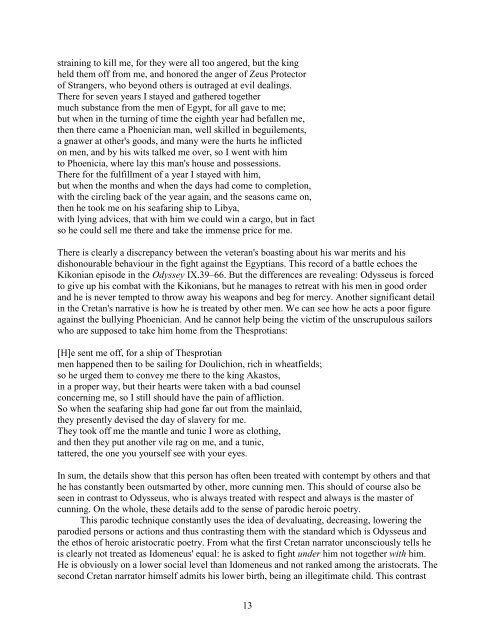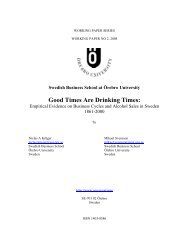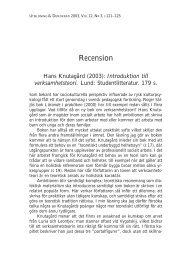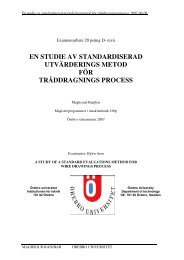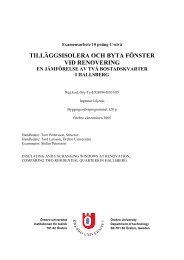Stories in Disguise: On Odysseus' Ithacan Lies and Their Relevance ...
Stories in Disguise: On Odysseus' Ithacan Lies and Their Relevance ...
Stories in Disguise: On Odysseus' Ithacan Lies and Their Relevance ...
You also want an ePaper? Increase the reach of your titles
YUMPU automatically turns print PDFs into web optimized ePapers that Google loves.
stra<strong>in</strong><strong>in</strong>g to kill me, for they were all too angered, but the k<strong>in</strong>g<br />
held them off from me, <strong>and</strong> honored the anger of Zeus Protector<br />
of Strangers, who beyond others is outraged at evil deal<strong>in</strong>gs.<br />
There for seven years I stayed <strong>and</strong> gathered together<br />
much substance from the men of Egypt, for all gave to me;<br />
but when <strong>in</strong> the turn<strong>in</strong>g of time the eighth year had befallen me,<br />
then there came a Phoenician man, well skilled <strong>in</strong> beguilements,<br />
a gnawer at other's goods, <strong>and</strong> many were the hurts he <strong>in</strong>flicted<br />
on men, <strong>and</strong> by his wits talked me over, so I went with him<br />
to Phoenicia, where lay this man's house <strong>and</strong> possessions.<br />
There for the fulfillment of a year I stayed with him,<br />
but when the months <strong>and</strong> when the days had come to completion,<br />
with the circl<strong>in</strong>g back of the year aga<strong>in</strong>, <strong>and</strong> the seasons came on,<br />
then he took me on his seafar<strong>in</strong>g ship to Libya,<br />
with ly<strong>in</strong>g advices, that with him we could w<strong>in</strong> a cargo, but <strong>in</strong> fact<br />
so he could sell me there <strong>and</strong> take the immense price for me.<br />
There is clearly a discrepancy between the veteran's boast<strong>in</strong>g about his war merits <strong>and</strong> his<br />
dishonourable behaviour <strong>in</strong> the fight aga<strong>in</strong>st the Egyptians. This record of a battle echoes the<br />
Kikonian episode <strong>in</strong> the Odyssey IX.39–66. But the differences are reveal<strong>in</strong>g: Odysseus is forced<br />
to give up his combat with the Kikonians, but he manages to retreat with his men <strong>in</strong> good order<br />
<strong>and</strong> he is never tempted to throw away his weapons <strong>and</strong> beg for mercy. Another significant detail<br />
<strong>in</strong> the Cretan's narrative is how he is treated by other men. We can see how he acts a poor figure<br />
aga<strong>in</strong>st the bully<strong>in</strong>g Phoenician. And he cannot help be<strong>in</strong>g the victim of the unscrupulous sailors<br />
who are supposed to take him home from the Thesprotians:<br />
[H]e sent me off, for a ship of Thesprotian<br />
men happened then to be sail<strong>in</strong>g for Doulichion, rich <strong>in</strong> wheatfields;<br />
so he urged them to convey me there to the k<strong>in</strong>g Akastos,<br />
<strong>in</strong> a proper way, but their hearts were taken with a bad counsel<br />
concern<strong>in</strong>g me, so I still should have the pa<strong>in</strong> of affliction.<br />
So when the seafar<strong>in</strong>g ship had gone far out from the ma<strong>in</strong>laid,<br />
they presently devised the day of slavery for me.<br />
They took off me the mantle <strong>and</strong> tunic I wore as cloth<strong>in</strong>g,<br />
<strong>and</strong> then they put another vile rag on me, <strong>and</strong> a tunic,<br />
tattered, the one you yourself see with your eyes.<br />
In sum, the details show that this person has often been treated with contempt by others <strong>and</strong> that<br />
he has constantly been outsmarted by other, more cunn<strong>in</strong>g men. This should of course also be<br />
seen <strong>in</strong> contrast to Odysseus, who is always treated with respect <strong>and</strong> always is the master of<br />
cunn<strong>in</strong>g. <strong>On</strong> the whole, these details add to the sense of parodic heroic poetry.<br />
This parodic technique constantly uses the idea of devaluat<strong>in</strong>g, decreas<strong>in</strong>g, lower<strong>in</strong>g the<br />
parodied persons or actions <strong>and</strong> thus contrast<strong>in</strong>g them with the st<strong>and</strong>ard which is Odysseus <strong>and</strong><br />
the ethos of heroic aristocratic poetry. From what the first Cretan narrator unconsciously tells he<br />
is clearly not treated as Idomeneus' equal: he is asked to fight under him not together with him.<br />
He is obviously on a lower social level than Idomeneus <strong>and</strong> not ranked among the aristocrats. The<br />
second Cretan narrator himself admits his lower birth, be<strong>in</strong>g an illegitimate child. This contrast<br />
13


